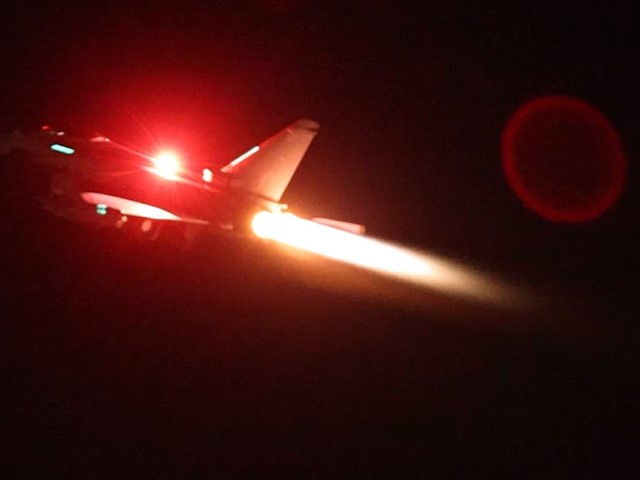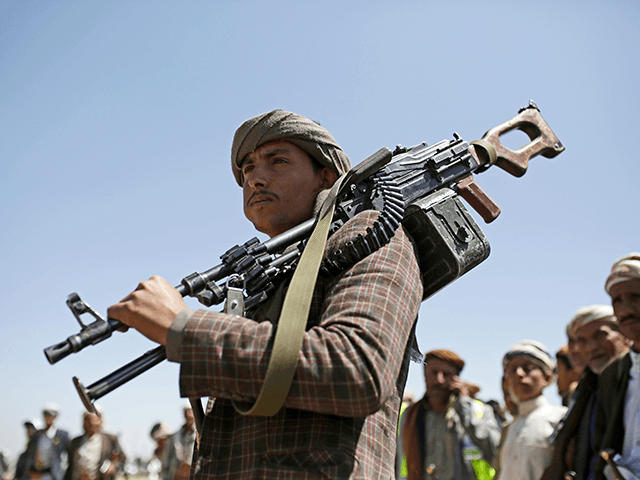A representative of Yemen’s largely powerless legitimate government told the Chinese government in a meeting at the Foreign Ministry in Beijing on Tuesday that his administration “expects China to play a greater role in promoting peace and stability in the Middle East.”
Mansour Baggash, an undersecretary at the Yemeni Ministry of Foreign Affairs and Expatriates, invited the Chinese Communist Party to expand its leverage in the region during a meeting with Vice Foreign Minister Deng Li, the Chinese state newspaper Global Times reported on Wednesday.
Baggash reportedly said:
Yemen is ready to continuously deepen friendly and cooperative relations with China in various fields. The Yemeni side also appreciates China’s efforts in promoting the political settlement process of the Yemeni issue, thanks China for upholding an objective and impartial stance on the Palestinian-Israeli issue … and expects China to play a greater role in promoting peace and stability in the Middle East region.
Deng, in turn, asserted that Beijing still considers the presidential council of Yemen the legitimate government of that country — not the Shiite Houthi terrorist organization, which controls the national capital Sana’a, as well as swathes of the nation and its resources — and that Beijing was “willing to continue strengthening political mutual trust, enhancing exchanges and cooperation in various fields with Yemen, and promoting the further development of China-Yemen relations.”
The communist dictatorship of Xi Jinping has attempted to simultaneously forge deeper friendships with the Muslim governments of the Middle East while conducting genocide against the Muslim population of occupied East Turkistan, which China has administered as the “Xinjiang Uyghur Autonomous Region” since mass murderer Mao Zedong established the People’s Republic of China.
RELATED — Chinese Concentration Camp Survivor: I Saw People Tortured for Denying Xi Jinping Is God
It has largely succeeded: China has elevated its profile as a partner of the two most influential Mideast Muslim countries, Iran and Saudi Arabia, and become a pivotal voice in support of the terrorist organization Hamas at the United Nations in the aftermath of the October 7, 2023, atrocities against Israeli civilians. A month after the terrorist onslaught, which killed 1,200 people, China hosted a summit of Middle Eastern partners to discuss how to support Hamas and its “Palestinian cause” against Israel.
WHAT YOU NEED TO KNOW: Horror of the Hamas Terror Attack on Civilians at Kibbutz Be’eri in Israel
Joel B. Pollak / Breitbart NewsThe chaotic situation in Yemen, which has been in a state of civil war since 2014, began threatening China’s economic interests when the Houthis, in solidarity with Hamas, announced a campaign to attack commercial shipping vessels in the Red Sea in the aftermath of the October 7 attacks. Houthi leaders — receiving backing from Chinese ally Iran — have assured the Chinese and Russian governments they would not attack ships bearing the flag of those nations but only those with ties to Israel. In reality, they have attacked seemingly random ships, forcing shipping companies, many of them carrying Chinese cargo, to redirect away from the Red Sea and take the much longer sea route around the Cape of Good Hope in Africa. A report published by the South China Morning Post in January suggested Chinese export companies were desperately seeking a “Plan B” to avoid potential Houthi attacks around the Suez Canal route.

A view of the oil tanker Marlin Luanda on fire after an attack in the Gulf of Aden on January 27, 2024. (Indian Navy via AP)
The Global Times, in assessing the meeting with the Yemeni government official, suggested that China “can play a role in maintaining political stability in Yemen” but will likely not seek any military intervention in either direction, as the Houthis have such a deep relationship with Iran. The Yemeni government’s top backers on the international stage are officials in Saudi Arabia, which spearheaded a Mideast coalition effort that began in 2015 to combat the Houthis in response to their invasion and conquest of Sana’a in 2014. Beijing indirectly affected those hostilities by brokering a peace agreement between Iran and Saudi Arabia that allowed both countries to join the China-led BRICS economic and political coalition, named after founding nations Brazil, Russia, India, China, and South Africa.
Chinese regime “experts” told the Global Times that the meeting on Tuesday suggested that Yemen was trying to pull Beijing deeper into Middle East affairs.
“From this meeting, it is clear that Yemen also hopes that China can play a more proactive and positive role in the region,” Sun Degang, director of the Center for Middle Eastern Studies at Fudan University, was quoted as saying.
Another “expert,” Shanghai International Studies University professor Liu Zhongmin, suggested Yemen’s legitimate government “seems to have directly expressed its recognition of China’s role, especially in successfully facilitating reconciliation between Saudi Arabia and Iran.”
In response to the Houthis’ disruption of international commerce, the Yemeni government has increased its demands — without much success — for the world to aid its military efforts against the Iran-backed terrorists. The vice president of the ruling Presidential Leadership Council of Yemen, Aidarus al-Zoubaidi, traveled to the World Economic Forum summit in Davos, Switzerland, in January and called for the world to unite in backing Yemeni ground troops against the Houthis.
“An international and regional alliance is necessary to secure international navigation in the Red Sea,” Zoubaidi told the Agence France-Presse (AFP) at the event. “Ground forces must be supported on the ground, and these forces belong to the legitimate government. These forces are the ones who can achieve a victory on the ground because strong strikes without ground operations are useless.”
The leftist administration of American President Joe Biden and allies in the United Kingdom have conducted a series of airstrikes against Houthi targets, which Biden openly conceded he did not expect to make any difference in protecting the Red Sea.

A Royal Air Force (RAF) Typhoon aircraft takes off from RAF Akrotiri to join the U.S.-led coalition to conduct air strikes against Yemen’s Houthi rebels on January 11, 2024, in Akrotiri, Cyprus. (MoD Crown Copyright via Getty Images)
“Are they stopping the Houthis? No. Are they going to continue? Yes,” Biden said about the airstrikes in mid-January.

COMMENTS
Please let us know if you're having issues with commenting.